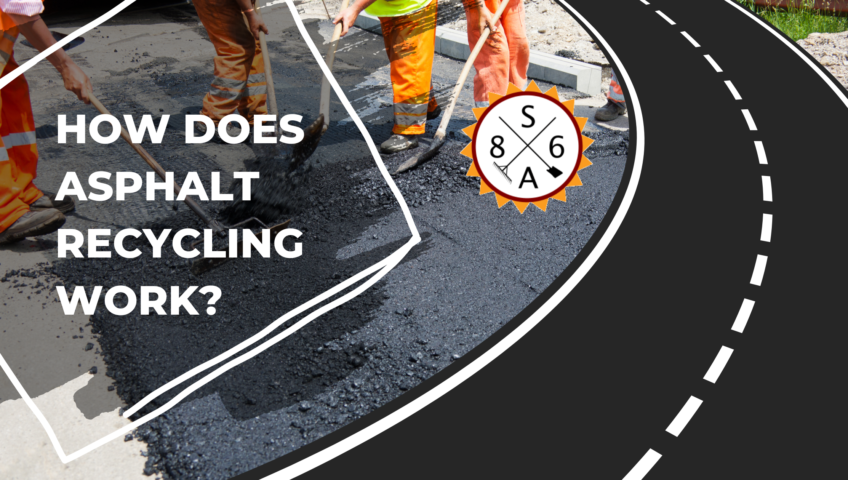
Does Asphalt Affect the Colorado Environment?
Asphalt has been used for centuries as a paving material. It is durable and weather-resistant. Asphalt in Colorado is used to create a variety of surfaces. But what are the environmental effects of using asphalt? Does it affect air quality? Water resources? How does the use of asphalt in Colorado impact city living? This blog post will take a closer look at asphalt and its effect on the Colorado environment.
The Asphalt Creation Process
Asphalt consists of two main ingredients: rock and bitumen. Rock is the foundation of asphalt pavement. It makes up 85-95% of asphalt pavement by weight and provides structural support for the pavement. The asphalt creation process begins with mining or quarrying rock. The rock is then transported to an asphalt plant, where it is crushed and
mixed with bitumen. Bitumen is a black or dark brown viscous material that binds the asphalt pavement together. It is made up of asphalt cement, a by-product of crude oil refining, and aggregate, a mixture of sand, gravel, and crushed stone.
The asphalt pavement is then placed on a road surface and compacted.
Is Asphalt Reusable?
Asphalt is a sustainable material that can be reused and recycled. It is the most recycled material in the United States. Asphalt companies in Colorado are committed to recycling asphalt pavement (RAP) and milling, which reduces waste and conserves resources.
When asphalt is removed from a road surface, it is crushed into smaller pieces and used as a base for new asphalt pavements. This process is called milling. Milling asphalt can be used to create various surfaces, such as:
- A temporary road surface while permanent repairs are being made
- A stable foundation for asphalt paving
- A drainage ditch lining
- A material to fill potholes
Asphalt companies in Colorado are also committed to using recycled asphalt shingles (RAS) in asphalt pavements. RAS is a sustainable material that can be used as an additive to hot mix asphalt (HMA). Adding RAS to HMA increases the pavement’s resistance to cracking and rutting and extends the pavement’s life. Asphalt companies in Colorado use RAS in the asphalt pavement to create a more sustainable product.
Asphalt’s Effect On Air, Water, And City Living
Air
While asphalt pavement is not a significant source of air pollution, asphalt production and asphalt paving can release emissions into the air. These emissions include:
- Carbon monoxide
- Nitrogen oxides
- Particulate matter
- Volatile organic compounds
Water
Asphalt production and asphalt paving can also affect water resources. The asphalt creation process uses a significant amount of water, and asphalt pavement itself can contaminate stormwater runoff if not maintained correctly.
City Living
Asphalt pavement can also impact city living as it is a significant source of noise pollution in cities. In addition, asphalt pavement can be a trip hazard, especially for pedestrians and cyclists.
In conclusion, asphalt pavement can impact the environment, but any asphalt company in Colorado is going to be part of the effort toward working to reduce the environmental impact of their products. They are exploring new methods of production that use recycled materials and are developing ways to reuse and recycle asphalt products. These efforts will help reduce waste produced by asphalt companies and contribute to a cleaner environment.
Asphalt has been used for centuries as a paving material. It is durable and weather-resistant. Asphalt in Colorado is used to create a variety of surfaces. But what are the environmental effects of using asphalt? Does it affect air quality? Water resources? How does the use of asphalt in Colorado impact city living? This blog post will take a closer look at asphalt and its effect on the Colorado environment.
The Asphalt Creation Process
Asphalt consists of two main ingredients: rock and bitumen. Rock is the foundation of asphalt pavement. It makes up 85-95% of asphalt pavement by weight and provides structural support for the pavement. The asphalt creation process begins with mining or quarrying rock. The rock is then transported to an asphalt plant, where it is crushed and
mixed with bitumen. Bitumen is a black or dark brown viscous material that binds the asphalt pavement together. It is made up of asphalt cement, a by-product of crude oil refining, and aggregate, a mixture of sand, gravel, and crushed stone.
The asphalt pavement is then placed on a road surface and compacted.
Is Asphalt Reusable?
Asphalt is a sustainable material that can be reused and recycled. It is the most recycled material in the United States. Asphalt companies in Colorado are committed to recycling asphalt pavement (RAP) and milling, which reduces waste and conserves resources.
When asphalt is removed from a road surface, it is crushed into smaller pieces and used as a base for new asphalt pavements. This process is called milling. Milling asphalt can be used to create various surfaces, such as:
- A temporary road surface while permanent repairs are being made
- A stable foundation for asphalt paving
- A drainage ditch lining
- A material to fill potholes
Asphalt companies in Colorado are also committed to using recycled asphalt shingles (RAS) in asphalt pavements. RAS is a sustainable material that can be used as an additive to hot mix asphalt (HMA). Adding RAS to HMA increases the pavement’s resistance to cracking and rutting and extends the pavement’s life. Asphalt companies in Colorado use RAS in the asphalt pavement to create a more sustainable product.
Asphalt’s Effect On Air, Water, And City Living
Air
While asphalt pavement is not a significant source of air pollution, asphalt production and asphalt paving can release emissions into the air. These emissions include:
- Carbon monoxide
- Nitrogen oxides
- Particulate matter
- Volatile organic compounds
Water
Asphalt production and asphalt paving can also affect water resources. The asphalt creation process uses a significant amount of water, and asphalt pavement itself can contaminate stormwater runoff if not maintained correctly.
City Living
Asphalt pavement can also impact city living as it is a significant source of noise pollution in cities. In addition, asphalt pavement can be a trip hazard, especially for pedestrians and cyclists.
In conclusion, asphalt pavement can impact the environment, but any asphalt company in Colorado is going to be part of the effort toward working to reduce the environmental impact of their products. They are exploring new methods of production that use recycled materials and are developing ways to reuse and recycle asphalt products. These efforts will help reduce waste produced by asphalt companies and contribute to a cleaner environment.

